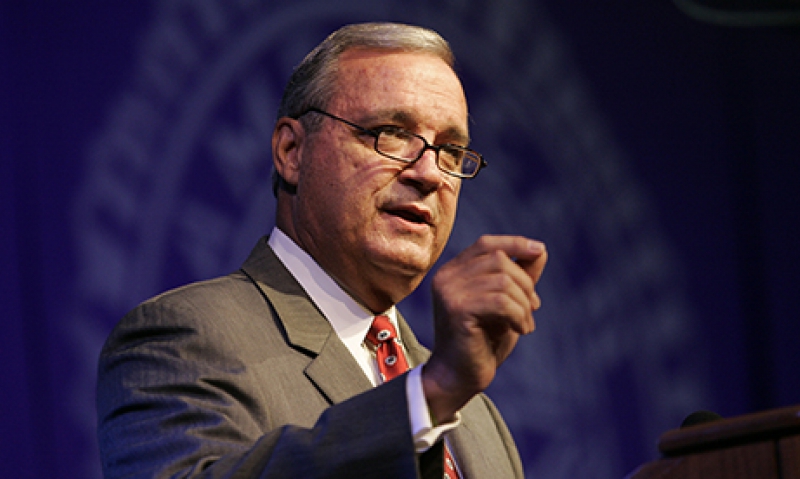
Miller aims to protect veterans benefits
The Joint Select Committee on Deficit Reduction has been tasked with slashing more than a trillion dollars from the U.S. budget. But according to U.S. Rep. Jeff Miller, that task shouldn't include slashing from two critical programs: veterans benefits and national security.
Miller, chairman of the House Committee on Veterans' Affairs, told The American Legion National Convention today that the U.S. military and those who once served in it shouldn't be on the chopping block when it comes to budget cutbacks.
"The Constitution provides for spending for the common defense and providing for the welfare of our common citizens," Miller told convention delegates in Minneapolis. "Funding for America's veterans programs, I believe, is a critical element to the common defense of this nation, and I believe you will see that reflected in the spending priorities in this Congress. While we tighten our belts, let us remember that we are still engaged in two wars, and that we are in conflicts around the globe. Funding for our military and our veterans is and will remain one of this nation's highest priorities.
"As chairman of the House Veterans' Affairs Committee, I promise that I will ... stand steadfast in assuring that America's veterans are not political pawns in this process."
Miller said that protecting veterans benefits isn't his only priority. Finding them jobs also is critical. Miller referenced legislation he's introduced - the "Veterans Opportunity to Work Act of 2011or the "VOW Act" - as a step in this direction.
"The VOW Act will assure that we have the most trained, the most skilled work force since the second world war," he said. "Our soldiers, our Marines, our sailors, our airmen and our Coast Guard returning from Afghanistan and Iraq face higher unemployment than the national average. Nearly 1 million veterans are out of work, and I'm sure that you'll agree with me that number's unacceptable."
Miller said the VOW Act has five components - enhancing the Transition Assistance Programs (TAP), increasing the number of veterans attending college, protecting the jobs of reservists and National Guardsmen who are placed on active duty, breaking down the barriers between military job skills vs. civilian job skills, and task incentives for small businesses that employ veterans.
"The government's role is not to create jobs," Miller said. "But what the government can do is create the right environment for the job market itself to flourish. We do this by releasing the burdens of overreaching regulations that encumber America's small businesses - the engine of our economy."
Miller also said that veterans suffering from post-traumatic stress and traumatic brain injuries cannot be forgotten. "These can be some of the hardest wounds to treat," he said. "But we can, and we will, help these men and women get on the track to recovery. Either we take action to address deficiencies in the current system - which many opt out of before even receiving treatment - or we maintain the status quo. The status quo with a rising suicide rate is not acceptable.
"We need to transform the culture of (the Department of Veterans Affairs) so that all veterans feel welcome. It's not an easy task, but I believe it can, and must, be done. It is incumbent upon all of us to reach out to those who are in pain, and we've also got to make them get as well as possible and stop just masking the symptoms with drugs."
Miller also addressed VA's disability claims backlog. "We have heard for too many years too many promises," he said. "This Congress will turn the corner and make VA accountable to assure accuracy the first time a claim is submitted."
